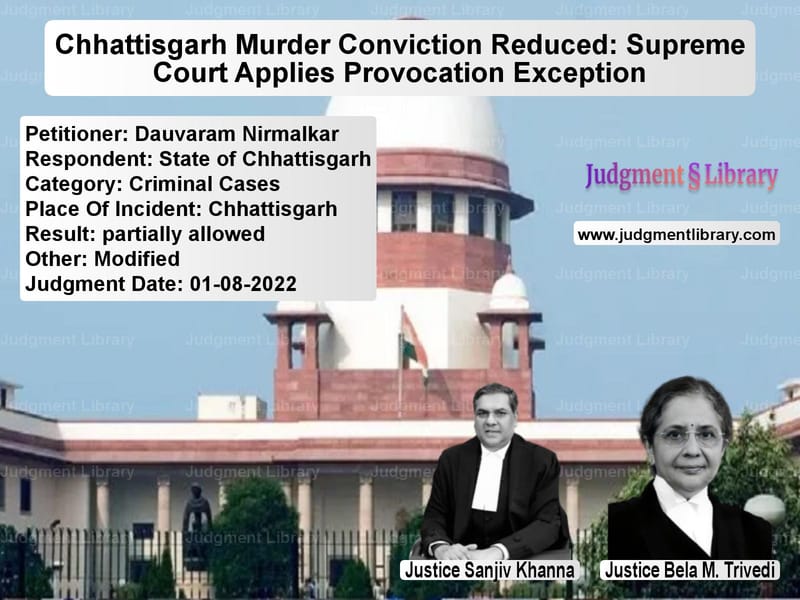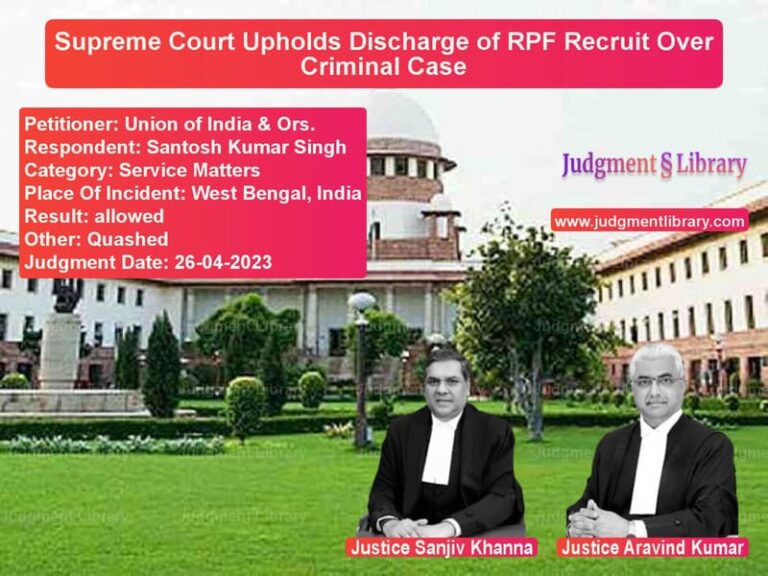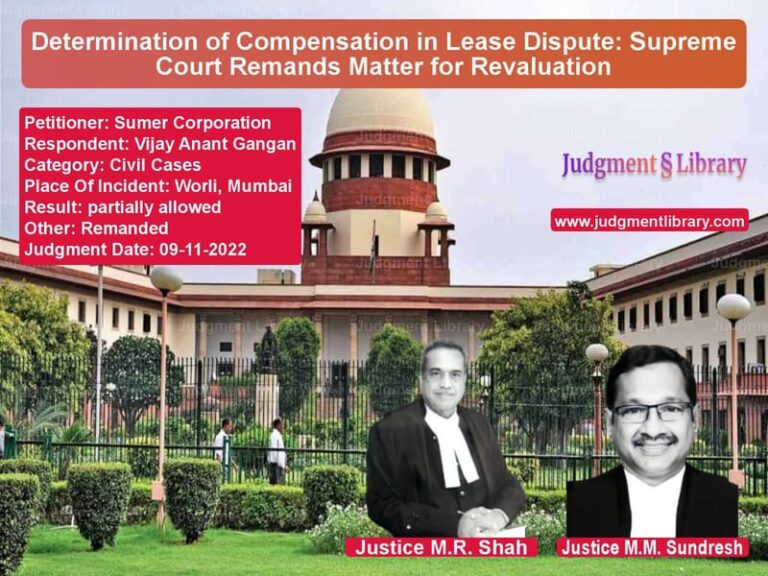Chhattisgarh Murder Conviction Reduced: Supreme Court Applies Provocation Exception
The case of Dauvaram Nirmalkar vs. State of Chhattisgarh revolves around a tragic family dispute that led to the killing of the appellant’s brother, Dashrath Nirmalkar. The Supreme Court examined whether the appellant’s actions met the criteria for ‘murder’ under Section 302 of the Indian Penal Code (IPC) or whether the crime could be categorized under the provocation exception, which allows for a lesser sentence. Ultimately, the Court found that the case fell under Exception 1 to Section 300 IPC and reduced the conviction from murder to culpable homicide not amounting to murder.
Background of the Case
The appellant, Dauvaram Nirmalkar, was convicted under Section 302 IPC for the murder of his brother, Dashrath Nirmalkar, and was sentenced to life imprisonment by the trial court. The case was based on the following facts:
- The appellant and the deceased lived in separate rooms within the same house.
- The deceased had a history of alcohol addiction and was frequently abusive toward the appellant.
- On the night of the incident, the appellant attacked his brother with a pick-axe, causing fatal head injuries.
- The appellant then attempted suicide by holding live electrical wires.
- He later went to the police station and confessed to the crime.
The prosecution argued that the appellant had intentionally killed his brother, while the defense contended that the act was committed in a fit of rage due to sustained provocation.
Arguments Presented
Petitioner’s (Appellant’s) Arguments
- The appellant did not act with premeditation but was provoked due to the deceased’s continued abusive behavior.
- There was a sudden and grave provocation immediately before the act, leading to a temporary loss of self-control.
- The appellant had no history of violent behavior, and his attempt to commit suicide after the incident indicated deep remorse.
- The case should fall under Exception 1 to Section 300 IPC and be classified as culpable homicide not amounting to murder.
Respondent’s (State’s) Arguments
- The prosecution relied on circumstantial evidence to establish that the appellant intentionally killed his brother.
- The appellant’s confession at the police station was inadmissible under Section 25 of the Indian Evidence Act, but his conduct and the discovery of the murder weapon were valid evidence.
- The prosecution argued that the crime was brutal and did not fall under the exceptions to murder.
Supreme Court’s Observations
The Supreme Court, comprising Justice Sanjiv Khanna and Justice Bela M. Trivedi, analyzed whether the case met the criteria for the provocation exception under IPC.
On Provocation
The Court noted:
“Exception 1 to Section 300 IPC applies when due to grave and sudden provocation, the offender, deprived of the power of self-control, causes the death of the person who gave the provocation.”
It further observed:
“There can be sustained and continuous provocations over a period of time, albeit in such cases Exception 1 applies when preceding the offence, there was a last act, word, or gesture amounting to sudden provocation.”
On the Conduct of the Appellant
- The appellant suffered burn injuries after trying to commit suicide, indicating deep remorse.
- The appellant and the deceased had frequent altercations, and the deceased was known for his abusive behavior.
- Multiple witnesses, including family members, testified that the deceased was an alcoholic and had repeatedly tormented the appellant.
On the Admissibility of Confession
The Court reaffirmed that:
“A confession to the police is inadmissible under Section 25 of the Evidence Act. However, the conduct of the accused is relevant under Section 8 of the Evidence Act.”
Judgment and Its Implications
The Supreme Court modified the conviction:
- The conviction under Section 302 IPC was reduced to Section 304 Part I IPC (culpable homicide not amounting to murder).
- The appellant was sentenced to the period already undergone (over 10 years in prison).
- He was fined Rs. 1,000, with a default penalty of six months of simple imprisonment.
- He was ordered to be released immediately, provided he was not required in any other case.
Significance of the Judgment
This ruling is significant because:
- Recognition of Sustained Provocation: The judgment acknowledges that continuous abuse over time can lead to an eventual act of sudden provocation.
- Clarity on Exception 1 to Section 300 IPC: The ruling helps differentiate between intentional murder and culpable homicide committed in the heat of the moment.
- Application of Sentencing Principles: The decision highlights the importance of considering mitigating circumstances, such as remorse and provocation, when determining the quantum of punishment.
Conclusion
The Supreme Court’s judgment in Dauvaram Nirmalkar vs. State of Chhattisgarh serves as an important precedent in criminal law. It reinforces that murder convictions must be carefully analyzed to determine whether mitigating factors warrant a lesser charge. The recognition of sustained provocation ensures that justice is served in a fair and balanced manner.
Petitioner Name: Dauvaram Nirmalkar.Respondent Name: State of Chhattisgarh.Judgment By: Justice Sanjiv Khanna, Justice Bela M. Trivedi.Place Of Incident: Chhattisgarh.Judgment Date: 01-08-2022.
Don’t miss out on the full details! Download the complete judgment in PDF format below and gain valuable insights instantly!
Download Judgment: dauvaram-nirmalkar-vs-state-of-chhattisgar-supreme-court-of-india-judgment-dated-01-08-2022.pdf
Directly Download Judgment: Directly download this Judgment
See all petitions in Murder Cases
See all petitions in Attempt to Murder Cases
See all petitions in Judgment by Sanjiv Khanna
See all petitions in Judgment by Bela M. Trivedi
See all petitions in partially allowed
See all petitions in Modified
See all petitions in supreme court of India judgments August 2022
See all petitions in 2022 judgments
See all posts in Criminal Cases Category
See all allowed petitions in Criminal Cases Category
See all Dismissed petitions in Criminal Cases Category
See all partially allowed petitions in Criminal Cases Category






